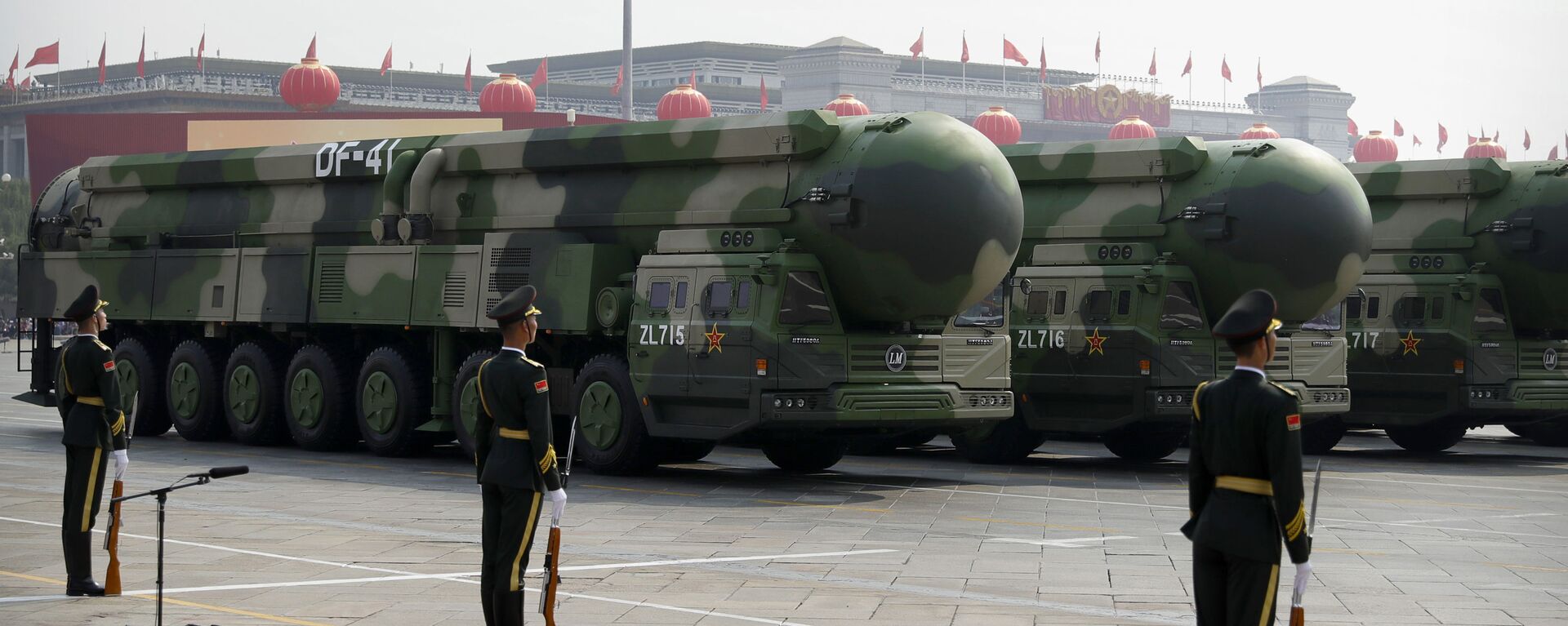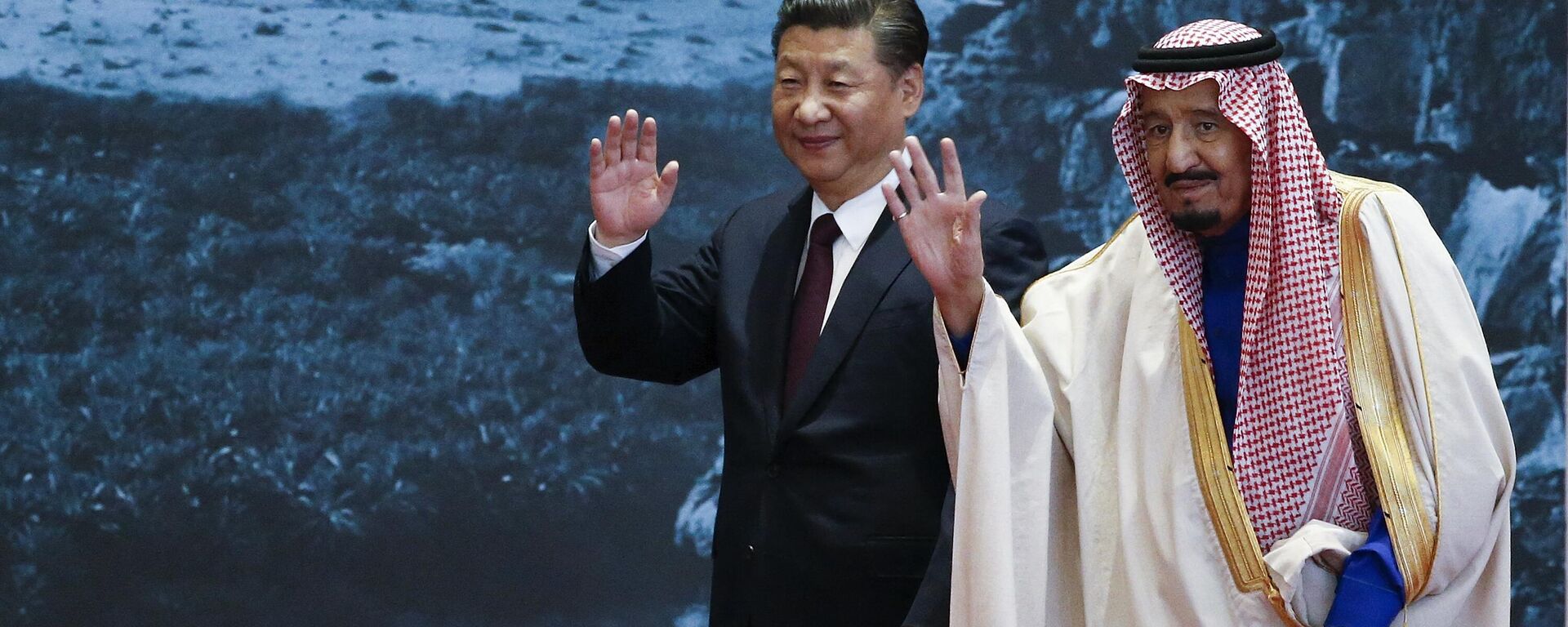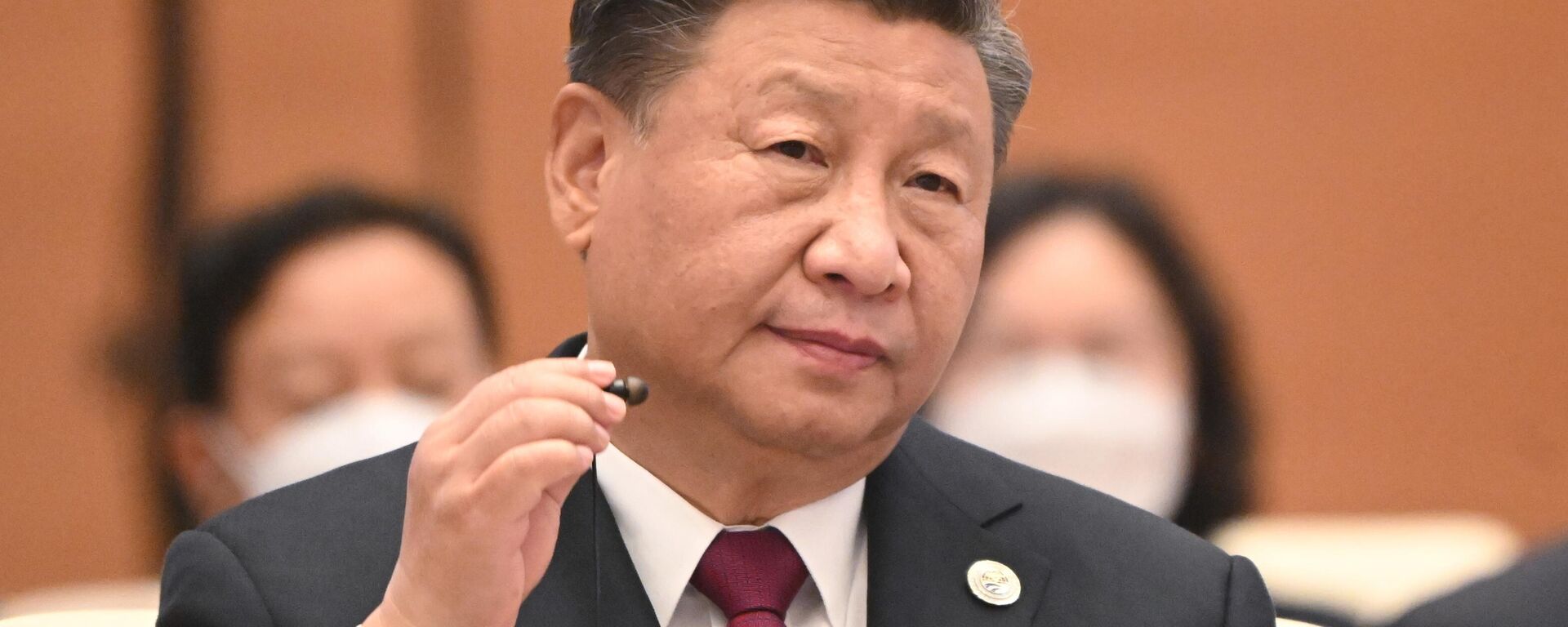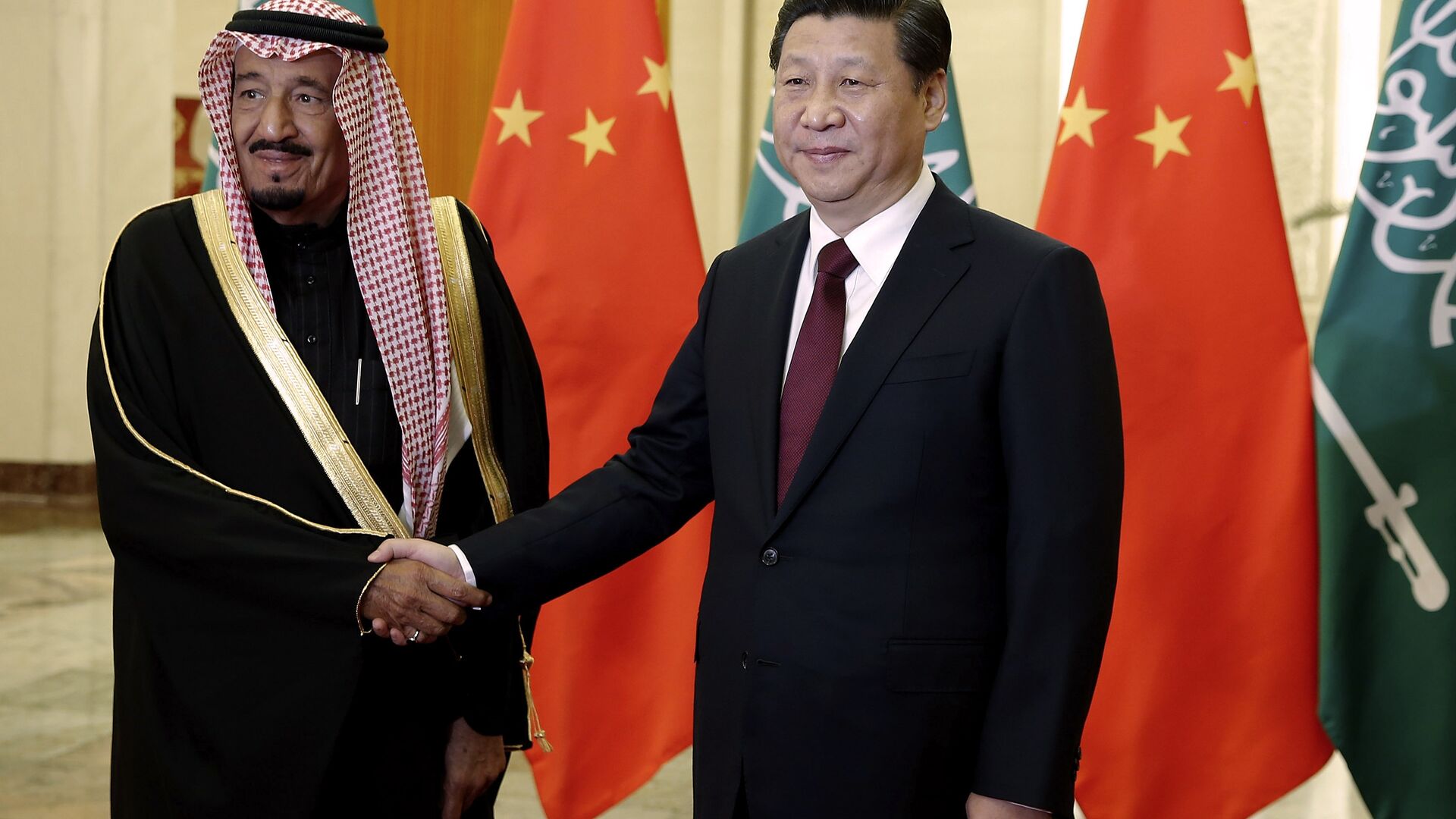https://sputnikglobe.com/20221207/xis-visit-to-saudi-arabia-why-is-riyadh-enhancing-relations-with-china-1105166558.html
Xi's Visit to Saudi Arabia: Why is Riyadh Enhancing Relations With China?
Xi's Visit to Saudi Arabia: Why is Riyadh Enhancing Relations With China?
Sputnik International
Chinese President Xi Jinping has embarked on a three-day tour to Saudi Arabia with the US media lamenting that the Chinese leader is being given a warm... 07.12.2022, Sputnik International
2022-12-07T17:34+0000
2022-12-07T17:34+0000
2022-12-07T17:34+0000
analysis
us
middle east
saudi arabia
china
asia
oil
technology
opec
https://cdn1.img.sputnikglobe.com/img/103513/70/1035137082_0:156:3001:1844_1920x0_80_0_0_509decd97f02e06799b7980ce12015eb.jpg
"It is not a Christmas visit, it is a historical one by itself and because of the surrounding circumstances, regionally and on the international level," Oraib Al-Rantawi, founder and director general of the Amman-based Al Quds Center for Political Studies, told Sputnik. "The two countries are supposed to sign huge contracts. Not necessarily in the security and defense fields, but merely in infrastructure. Saudi Arabia is planning a huge development investment in the upcoming ten years within the 2030 vision for the Crown Prince, and China is supposed to play a serious role in implementing this vision in the upcoming years, especially in infrastructure, communication, transportation."The timing of the visit speaks volumes: US-China tensions are at an all-time high and there are also problems in the US’ relations with the kingdom, noted Mehran Kamrava, professor of government at Georgetown University in Qatar.Earlier this year, the Biden administration failed to convince Saudi Arabia to step up oil production to suppress global prices. By summer 2022, US gasoline prices had soared more than two-fold since the beginning of 2021.Joe Biden's visit to the Gulf in July 2022 was surrounded by controversy since the US president previously vowed to turn Saudi Arabia into a "pariah state," snubbed Saudi Crown Prince Mohammed bin Salman (MBS), and shelved some lucrative arms deals struck by his predecessor Donald Trump. Therefore, it was hardly surprising that MBS greeted Biden with a mere fist-bump and explained to the US president that Riyadh does not have the capacity to immediately increase the output of crude.Likewise, Washington's relations with Beijing could not be called "rosy." Even though Xi Jinping and Joe Biden met in mid-November in Indonesia and agreed to "empower key senior officials" to cooperate on a number of issues, including climate change, global finance, health and food stability, tensions persist.Earlier this year, the Biden administration irritated Beijing by controversial statements about Taiwan, regarded by the People's Republic as its inalienable part, House Speaker Nancy Pelosi's visit to Taipei, and the US' muscle-flexing in the Asia-Pacific region. On top of that, Biden crippled China's access to western semiconductor technologies.In a word, the Biden administration appears to have made every effort to alienate both Riyadh and Beijing.Riyadh's Strategic MoveThe December summit with Xi is a strategic move by the Saudi kingdom, not a tactical one, according to Dr. Hesham Alghannam, a Saudi political scientist and international relations expert."The Saudis seem unwilling to accept any limits in their relations with other major powers, mainly China and Russia, learning from some past mistakes and developing interests with everyone," Alghannam told Sputnik.The Saudi political scientist explained that Riyadh does not want to downsize its cooperation with the US: "Neither China nor any other state can compensate what America is doing or can do for the GCC or the kingdom," he stressed. The Saudi goal is to maintain a partnership with China "based on the exchange of interests in a way that magnifies these interests in the GCC," according to Alghannam.At the same time, relations with China provide Riyadh with a sort of leverage against the Democratic administration, which has weaponized human rights issues to exert pressure on its partners and rivals alike, according to Mehran Kamrava."With this relationship, Saudi Arabia can impress on the United States that if the US is vocal in criticizing it, for example in the human rights arena, the Kingdom will draw itself closer to China," he said. "There are limits and drawbacks to that approach, but it can also be effective in helping Saudi goals in relations to the US."Riyadh's fading trust in the Democrats appears to go back to the times of the Obama administration, which had strained relations with King Abdullah bin Abdulaziz Al Saud over the US' nuclear deal with Iran and Washington cracking down on Egypt under Abdel Fattah al-Sisi, a Riyadh's ally. Biden's continuous snubbing of his Saudi allies has exacerbated the trend, according to the observers.Saudi-China Cooperation: A Two-Way StreetChina is set to benefit from enhanced Saudi-Chinese relations, according to Thomas W. Pauken II, the author of "US vs China: From Trade War to Reciprocal Deal," a Beijing-based consultant on Asia-Pacific affairs and a geopolitical commentator.Furthermore, China is the world's largest consumer of energy currently: it's the largest importer, probably the largest energy importer at the moment, Pauken noted. Against this backdrop, it's quite logical that Saudi Arabia, Qatar and other energy producers are flocking to provide oil and gas to the Asian giant despite Washington's displeasure. The formula is simple – money talks, and the US should not be surprised by this."Whereas the US wants to say, oh, you can't do business with China, the Middle East is not going to agree to that because they have these deals with China already, and they intend to keep those agreements and honor them," the Beijing-based author emphasized.Still, Sino-Saudi cooperation is a two-way street: it also helps the Gulf state to diversify its economy and boost its science and technology, according to Pauken. The People's Republic has made a lot of progress in these fields and has technology, expertise and best practices to share with its Saudi partners.Indeed, Saudi Arabia has been deepening its partnership with China in terms of scientific and economic cooperation over the last ten years, Alghannam agreed. He noted that the two countries collaborated in the fields of satellites, space technology, and drones."Saudi Arabia is now the first in the Arab world in this type of cooperation with China, which extended to universities and others, but it is also the first with other different regions in the world," the Saudi political scientist highlighted.What are the Potential Consequences?"Of course, any presence of China, Russia or any other major emerging countries and economies in this region is the main source of concern for the United States," said Oraib Al-Rantawi. "The dilemma here is that the Americans have openly said that they want to focus on the two oceans, the Indian and Pacific Oceans, Asia, China, Russia or Asia and not the Middle East anymore."According to the scholar, any improvement in the bilateral relationship between Arab countries and China or Russia could be at the expense of the US influence in the region.The scholar expects that Washington will "try hard to slow down or make it difficult for Saudi Arabia to capitalize in its improving relationship with China." The question is whether the US has enough tools to throw a wrench in the Sino-Saudi gears. Al-Rantawi suggested that Washington couldn't succeed: if it tries to punish Riyadh, it will only accelerate the latter's rapprochement with Beijing.At the same time, the scholar forecast that the Saudis will tread carefully since they are planning to maintain relations with all global players, including BRICS, the US and the EU to the Gulf Kingdom's benefit.
https://sputnikglobe.com/20221206/beijing-rips-uss-old-trick-of-hyping-china-threat-as-dod-projects-four-fold-jump-in-chinese-nukes-1105104960.html
https://sputnikglobe.com/20221207/chinese-president-arrives-in-saudi-arabia-to-attend-inaugural-sino-arab-summit-1105164679.html
https://sputnikglobe.com/20221207/chinese-president-starts-3-day-visit-to-saudi-arabia-1105122568.html
saudi arabia
china
Sputnik International
feedback@sputniknews.com
+74956456601
MIA „Rosiya Segodnya“
2022
News
en_EN
Sputnik International
feedback@sputniknews.com
+74956456601
MIA „Rosiya Segodnya“
Sputnik International
feedback@sputniknews.com
+74956456601
MIA „Rosiya Segodnya“
xi jinping's visit to saudi arabia, saudi-china cooperation, joe biden, crown prince mohammed bin salman, opec+ deal, oil, china
xi jinping's visit to saudi arabia, saudi-china cooperation, joe biden, crown prince mohammed bin salman, opec+ deal, oil, china
Xi's Visit to Saudi Arabia: Why is Riyadh Enhancing Relations With China?
Chinese President Xi Jinping has embarked on a three-day tour to Saudi Arabia with the US media lamenting that the Chinese leader is being given a warm welcome, a far cry from US President Joe Biden's chilly talks in the Saudi kingdom last summer.
"It is not a Christmas visit, it is a historical one by itself and because of the surrounding circumstances, regionally and on the international level," Oraib Al-Rantawi, founder and director general of the Amman-based Al Quds Center for Political Studies, told Sputnik.
"The two countries are supposed to sign huge contracts. Not necessarily in the security and defense fields, but merely in infrastructure. Saudi Arabia is planning a huge development investment in the upcoming ten years within the 2030 vision for the Crown Prince, and China is supposed to play a serious role in implementing this vision in the upcoming years, especially in infrastructure, communication, transportation."
The timing of the visit speaks volumes: US-China tensions are at an all-time high and there are also problems in the US’ relations with the kingdom, noted Mehran Kamrava, professor of government at Georgetown University in Qatar.
"The larger context within which the trip takes place, its timing, is what is critically important," Kamrava told Sputnik.
Earlier this year, the Biden administration failed to convince Saudi Arabia to step up oil production to suppress global prices. By summer 2022, US gasoline prices had soared more than two-fold since the beginning of 2021.
Joe Biden's visit to the Gulf in July 2022 was surrounded by controversy since the US president previously
vowed to turn Saudi Arabia into a "pariah state," snubbed Saudi Crown Prince Mohammed bin Salman (MBS), and shelved some lucrative arms deals struck by his predecessor Donald Trump. Therefore, it was hardly surprising that MBS greeted Biden with a mere fist-bump and
explained to the US president that Riyadh does not have the capacity to immediately increase the output of crude.
Likewise, Washington's relations with Beijing could not be called "rosy." Even though Xi Jinping and Joe Biden met in mid-November in Indonesia and agreed to "empower key senior officials" to cooperate on a number of issues, including climate change, global finance, health and food stability, tensions persist.
Earlier this year, the Biden administration irritated Beijing by controversial statements about Taiwan, regarded by the People's Republic as its inalienable part,
House Speaker Nancy Pelosi's visit to Taipei, and the US' muscle-flexing in the Asia-Pacific region. On top of that, Biden crippled China's access to western semiconductor technologies.
In a word, the Biden administration appears to have made every effort to alienate both Riyadh and Beijing.

6 December 2022, 13:48 GMT
The December summit with Xi is a strategic move by the Saudi kingdom, not a tactical one, according to Dr. Hesham Alghannam, a Saudi political scientist and international relations expert.
"The Saudis seem unwilling to accept any limits in their relations with other major powers, mainly China and Russia, learning from some past mistakes and developing interests with everyone," Alghannam told Sputnik.
"Raising the slogan of diversifying the basket of partnerships and alliances does not come without pitfalls, pits and traps," he continued. "Mastering the balance between different superpowers is definitely not an easy matter governed by a clear equation from the beginning that you can apply and arrive to as a clear goal. Not every effort in that matter will result in a favorable outcome for the Saudis or the Gulf Cooperation Council (GCC) states, there will be losses, big losses for sure. But it's a learning process, and most importantly, it's essential to deal with errors while moving forward with this project."
The Saudi political scientist explained that Riyadh does not want to downsize its cooperation with the US: "Neither China nor any other state can compensate what America is doing or can do for the GCC or the kingdom," he stressed. The Saudi goal is to maintain a partnership with China "based on the exchange of interests in a way that magnifies these interests in the GCC," according to Alghannam.
At the same time, relations with China provide Riyadh with a sort of leverage against the Democratic administration, which has weaponized human rights issues to exert pressure on its partners and rivals alike, according to Mehran Kamrava.
"With this relationship, Saudi Arabia can impress on the United States that if the US is vocal in criticizing it, for example in the human rights arena, the Kingdom will draw itself closer to China," he said. "There are limits and drawbacks to that approach, but it can also be effective in helping Saudi goals in relations to the US."
Riyadh's fading trust in the Democrats appears to go back to the times of the Obama administration, which had strained relations with King Abdullah bin Abdulaziz Al Saud over the US' nuclear deal with Iran and Washington cracking down on Egypt under Abdel Fattah al-Sisi, a Riyadh's ally. Biden's continuous snubbing of his Saudi allies has exacerbated the trend, according to the observers.

7 December 2022, 15:55 GMT
Saudi-China Cooperation: A Two-Way Street
China is set to benefit from enhanced Saudi-Chinese relations, according to Thomas W. Pauken II, the author of "US vs China: From Trade War to Reciprocal Deal," a Beijing-based consultant on Asia-Pacific affairs and a geopolitical commentator.
"One of the main reasons is that China is now finally moving away from the COVID policy and as such, Chinese President Xi Jinping is now making more trips to other countries, which also now include Saudi Arabia," Pauken told Sputnik. "Saudi Arabia is a very important trip because it's one of the biggest economies in the Arab world and has a lot of influence in the region. Oil prices are likely to start going much higher in the near future, so China is trying to secure its energy demand because as it shifts away from a zero-COVID policy, there's going to be more flights. There's going to be more oil and gas being used."
Furthermore, China is the world's largest consumer of energy currently: it's the largest importer, probably the largest energy importer at the moment, Pauken noted. Against this backdrop, it's quite logical that Saudi Arabia, Qatar and other energy producers are flocking to provide oil and gas to the Asian giant despite Washington's displeasure. The formula is simple – money talks, and the US should not be surprised by this.
"Whereas the US wants to say, oh, you can't do business with China, the Middle East is not going to agree to that because they have these deals with China already, and they intend to keep those agreements and honor them," the Beijing-based author emphasized.
Still, Sino-Saudi cooperation is a two-way street: it also helps the Gulf state to diversify its economy and boost its science and technology, according to Pauken. The People's Republic has made a lot of progress in these fields and has technology, expertise and best practices to share with its Saudi partners.
Indeed, Saudi Arabia has been deepening its partnership with China in terms of scientific and economic cooperation over the last ten years, Alghannam agreed. He noted that the two countries collaborated in the fields of satellites, space technology, and drones.
"Saudi Arabia is now the first in the Arab world in this type of cooperation with China, which extended to universities and others, but it is also the first with other different regions in the world," the Saudi political scientist highlighted.

7 December 2022, 05:17 GMT
What are the Potential Consequences?
"Of course, any presence of China, Russia or any other major emerging countries and economies in this region is the main source of concern for the United States," said Oraib Al-Rantawi. "The dilemma here is that the Americans have openly said that they want to focus on the two oceans, the Indian and Pacific Oceans, Asia, China, Russia or Asia and not the Middle East anymore."
According to the scholar, any improvement in the bilateral relationship between Arab countries and China or Russia could be at the expense of the US influence in the region.
"Saudi Arabia is applying to be a member of the BRICS," Al-Rantawi highlighted. "And I think we will see a more balanced foreign policy adopted by Saudi Arabia and the Saudis. Maybe it will lead other Arab countries to follow the same track. And this will not be good news for the United States."
The scholar expects that Washington will "try hard to slow down or make it difficult for Saudi Arabia to capitalize in its improving relationship with China." The question is whether the US has enough tools to throw a wrench in the Sino-Saudi gears. Al-Rantawi suggested that Washington couldn't succeed: if it tries to punish Riyadh, it will only accelerate the latter's rapprochement with Beijing.
At the same time, the scholar forecast that the Saudis will tread carefully since they are planning to maintain relations with all global players, including BRICS, the US and the EU to the Gulf Kingdom's benefit.
"One could see that if the Gulf states, major Arab countries like Saudi Arabia succeed in diversifying their international relationships, international businesses, I think this will give these countries more room to maneuver and to take care in a better way about their own interests and not to be taken for granted from the United States perspective when it comes to international conflicts or international disputes around many other issues," Al-Rantawi concluded.







